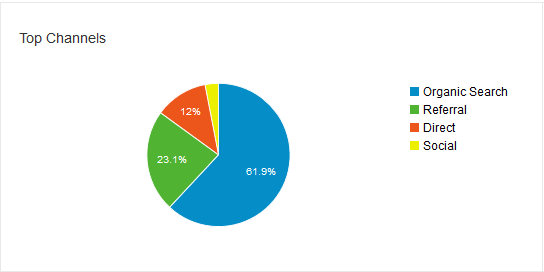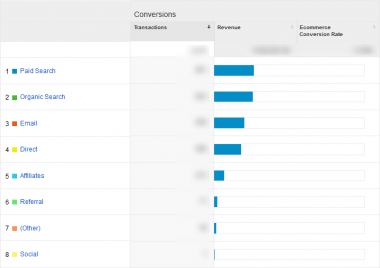“Link building is dead” is a phrase I’ve heard from a number of marketing consultants over the past few years.
It wasn’t too long ago, following the emergence of social media, and then Google+, that I heard many social media experts predicting that the importance of links would die off eminently.
These opinions have since been shredded as link building maintained its position as one of the most important marketing activities to increase search visibility.
From my perspective, consistently delivering great results in search has primarily been due to the impact of high quality backlinks that I’ve built for my clients over the last nine years.
Link Building Has Evolved
The role of a link builder has developed over the years, to the point where “link building” perhaps isn’t the best name for the services many agencies now offer.
Typically, the modern link Builder gets involved in PR and brand building a lot more often – forcing link builders into working much more closely with the SEO and social media teams. Because of this, many link building specialists are having to learn a broader range of skills, and develop their knowledge of marketing, more than ever before. Data capture, content creation, email marketing, and social all play into developing a successful link building strategy.
This need for an expansion of skills began after Google began to clean up their search results – resulting in penalties for sites with unethical link building strategies and backlink profiles, both manually and algorithmically.
The shortcuts a number of link builders used are no longer a path to success, whether it be short-term or long-term. And the introduction of the Google Penguin algorithm update has certainly forced an increase in the skills of the average link builder from two years ago and pushed them towards building a clean backlink profile for their clients and/or businesses.
Google Penguin has certainly been hitting a number of businesses and websites hard since its release into Google’s algorithm back in April 2012.
Matt Cutts Says Links Have Many Years Left
If we rewind our tapes all the way back to June 2012, Google’s head of web spam, Matt Cutts, spoke to Search Engine Land Editor-in-Chief Danny Sullivan, Mr. Cutts said:
“There’s this perception that everything will go social or that links will go obsolete, and I think it’s premature to reach that conclusion. I don’t doubt that in ten years things will be more social and those will be more powerful signals, but I wouldn’t write the epitaph for links quite yet.”
Just this past week however, Matt Cutts said that “over time there will be less emphasis on links” – referring to the Google search results. He did conclude that part of his speech with:
“I still think backlinks have many, many years left in them, but inevitably what we’re trying to do is figure out how an expert user would say, this particular page matched their information needs. Sometimes backlinks matter for that.
So I think over time backlinks will become a little less important.
Inevitably over time there will be a little less emphasis on links, but I would expect that for the next few years we will continue to use links in order to assess the basic reputation of pages and of sites.”
Why Link Building is Still Valuable
Working with numerous e-commerce clients, organic search is still the biggest referer of traffic and sales for the majority of these.
When the majority of your traffic is coming from organic search, it is important to maintain and improve your position in the search results. And if you’re not ranking in the search results you’re missing out on a wealth of traffic – it’s important for you to be there.
Getting to the top of Google still requires both SEO and link building – there have been a lot of changes in Google’s search algorithm over the past couple of years. There’s been a number of warnings for the type of links to avoid in order to keep within the guidelines. But links remain core to Google’s algorithm.
The goalposts haven’t really changed much over the years though. The shortcuts some SEOs and webmasters were taking – ie paid links, bulk directory submission, and mass anchor text links are now out of the equation. If anything, this makes it a fair playing field. The company who can make their brand the most popular and who produces the most successful campaigns rises to the top.
There’s no getting away from link building if you want to rank in Google. At least not in the near future. Link building isn’t about directory submissions etc. – it’s about building a brand, creating exposure, and ultimately, building a following.
Google Search Results Without Backlink Relevance
In February this year, Matt Cutts said in one of his videos on the Google Webmasters YouTube channel that Google has internally tested their search engine results without links and it was a disaster:
“We don’t have a version like that [search engine that excludes any backlink relevance] that is exposed to the public. But we have run experiments like that internally and the quality looks much, much worse. It turns out backlinks, even though there’s some noise and certainly a lot of spam, for the most part are still a really, really big win in terms of quality for search results.
So we’ve played around with the idea of turning off backlink relevance. And at least for now backlink relevance still really helps in terms of making sure that we return the best, most relevant, most topical set of search results.”
The Internet Relies on Links
Simply put, Google and internet users in general have always relied on links. If you’re old enough to remember the internet before Google and search engines, links were navigational tools to get from one place to another.
Directories were created and became popular for being a list of links or resources to help you find what you were looking for.
Google results are essentially a list of links. You search for a product, place, or ask a question and you’ll be shown a list of relevant links (hopefully they’re relevant) to what you’re looking for.
Your Business Relies on Links
Links are still the number one factor is getting your website visible in Google.
Perhaps it’s because I don’t work exclusively on social media, but all of my clients receive more traffic and conversions from search engines and referrals than from social. Here are a couple of examples:

Screenshot taken 13/05/2014 from Google Analytics

Screenshot taken 13/05/2014 from Google Analytics
While links influence search rankings, they remain important. And even Matt Cutts has said they will be around for many more years.
Follow Google’s guidelines and stay clear of link schemes. Keep your link building clean, develop your brand, and I promise you you’ll reap the benefits in the end – just don’t stop building links. And be sure to mix this up with PR, SEO, social, and email marketing to build a proper online marketing strategy for your business.
Featured image credit: unsplash.com. Used under license.





![[SEO, PPC & Attribution] Unlocking The Power Of Offline Marketing In A Digital World](https://www.searchenginejournal.com/wp-content/uploads/2025/03/sidebar1x-534.png)